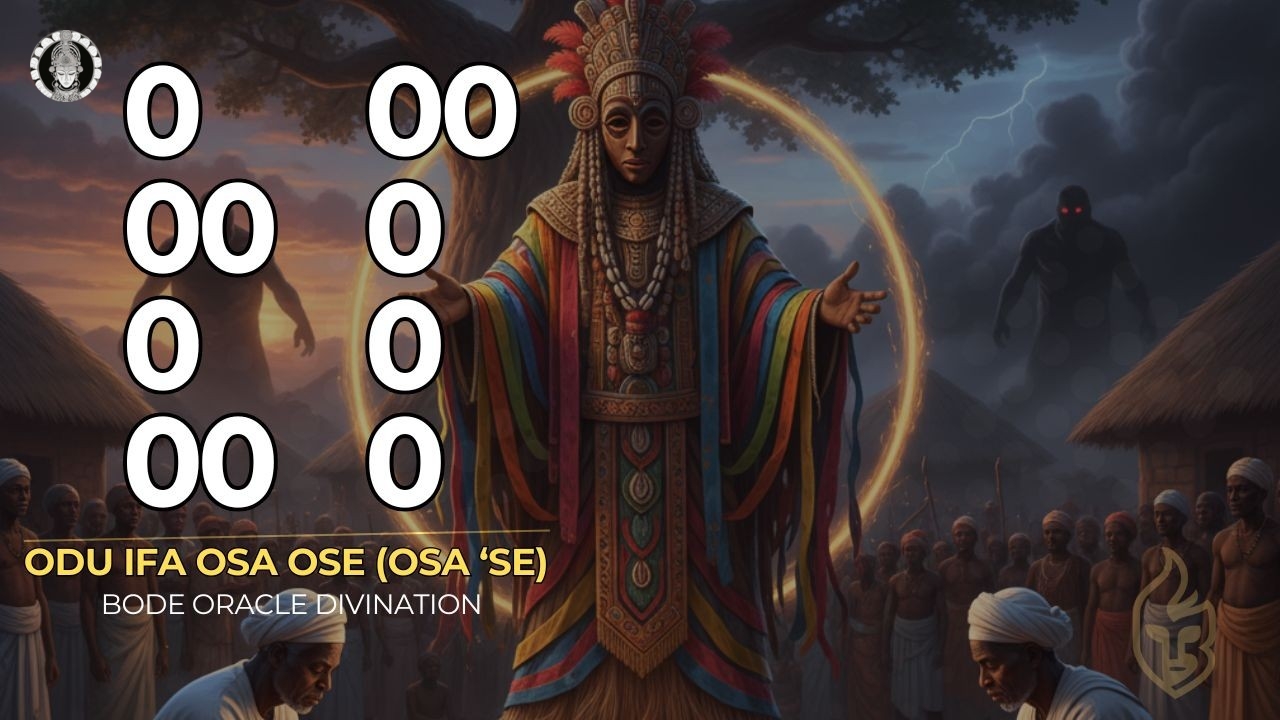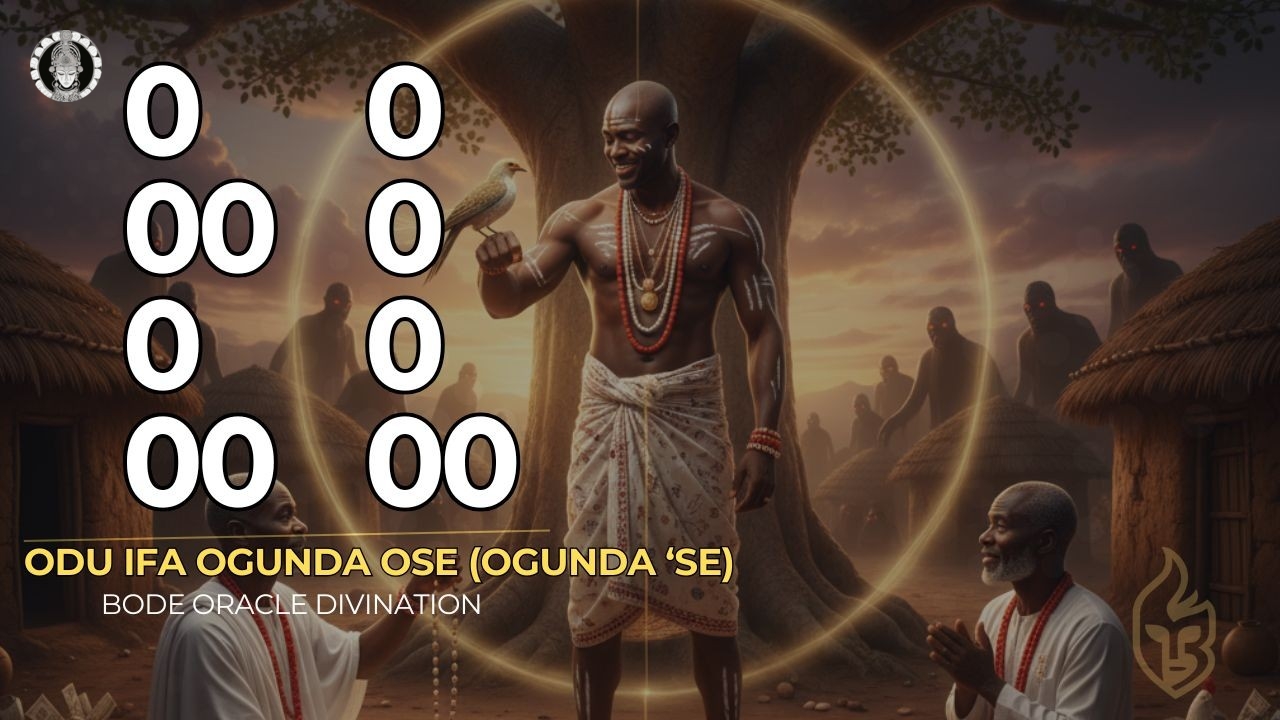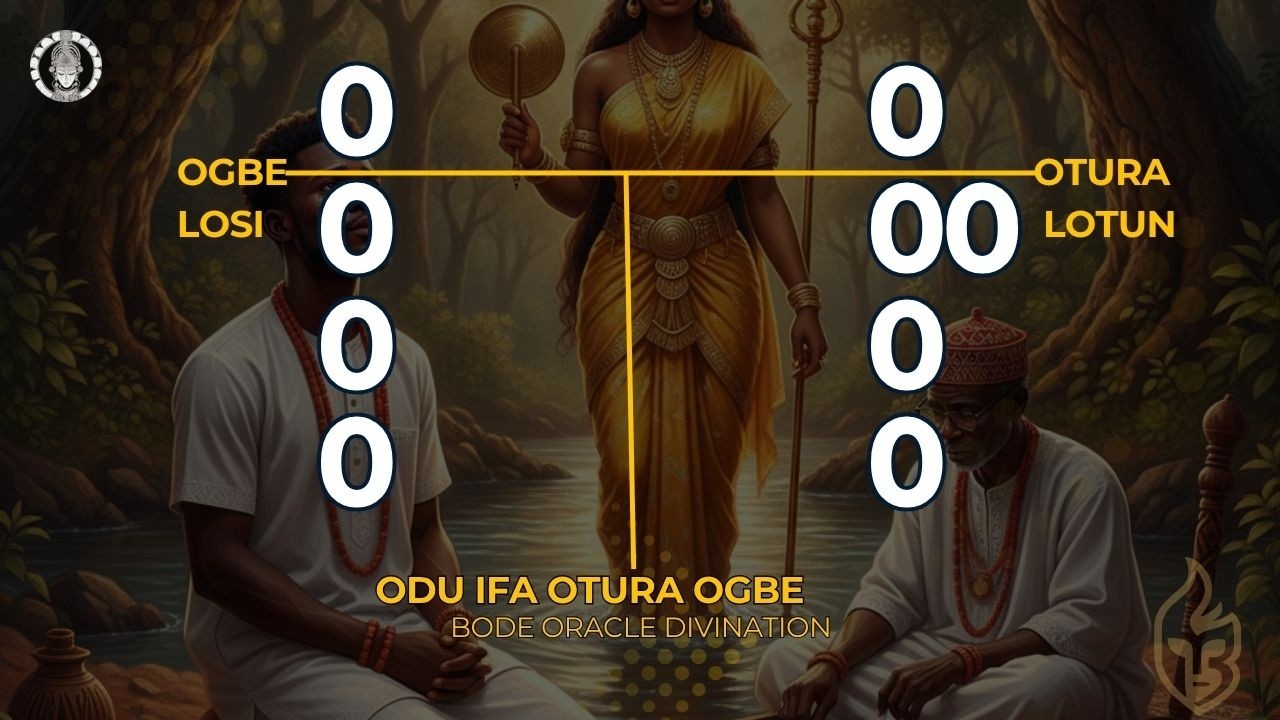Introduction to Odu Ifa Otura Ogbe (Otua Orogbe)
Odu Ifa Otura Ogbe, also known as Otua Orogbe, represents one of the 256 sacred divination signs in the Ifa corpus. This profound Odu carries messages about material prosperity, mental and physical wellness, protection of one's destiny against spiritual attacks, and the blessing of fertility. Through the wisdom of Otura Ogbe, we learn how proper sacrifices combined with feeding specific deities—particularly Osun—can manifest wealth, how mental health requires spiritual intervention, and how our destiny actively protects us when properly honored.
The divinations within Otura Ogbe address fundamental human needs: financial security and comfortable living, mental clarity and freedom from psychological disorders, spiritual protection from enemies' malicious intentions, and the joy of parenthood. Each story demonstrates the transformative power of compliance with Ifa's prescriptions, showing that knowledge becomes power only when translated into action. For comprehensive understanding of the 16 Odu Ifa and their meanings, explore our detailed guide.
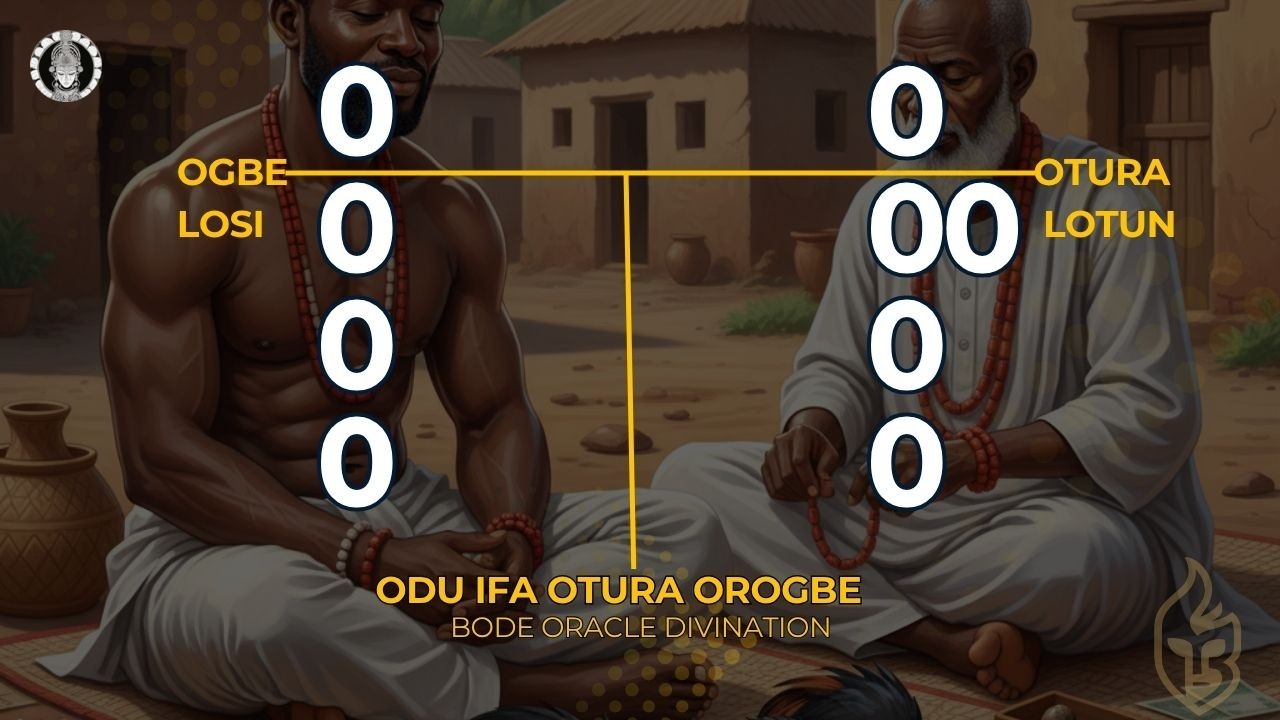
Ifa Divination for Alaba Owo: Attracting Wealth and Living Comfortably
Understanding the Blessing of Material Prosperity
This divination from Otura Ogbe addresses one of humanity's most persistent desires—financial security and the ability to live comfortably without constant struggle. Ifa reveals that the person receiving this Odu has a blessing of wealth (ola) waiting to manifest, but this manifestation requires both proper sacrifice and establishing relationship with Osun, the deity most associated with prosperity, beauty, and comfortable living.
The name Alaba Owo itself carries profound meaning: "Alaba" means "the child of" and "Owo" means money or wealth. Thus, Alaba Owo translates as "the child of the person who keeps money at home"—signifying not just temporary financial gain but sustained wealth that accumulates and remains stable. This is prosperity that transforms one's living conditions permanently rather than providing momentary relief.
The Spiritual Connection Between Osun and Wealth
Osun occupies a unique position in Yoruba cosmology as the deity governing not just wealth but the quality of life that wealth enables. Unlike raw power or authority, Osun represents refined prosperity—wealth that brings beauty, grace, comfort, and aesthetic pleasure. The instruction to feed Osun (bo Osun) in this divination establishes a spiritual relationship that ensures wealth arrives not as burden but as blessing, bringing joy rather than anxiety.
Osun's association with rivers also carries symbolic weight. Just as rivers flow continuously, bringing life-giving water to all they touch, so too does Osun's blessing bring continuous financial flow rather than stagnant accumulation. The person who honors Osun discovers that wealth becomes a flowing resource that meets needs, creates opportunities, and generates more abundance.
The Sacred Verse
Ire taipejamoja
Adifafun Alaba owo
Omo osungbedu
Igba ti n momi oju so gbere ire
Ebo won ni o se
O si gbebo nibe orubo
Nje, osun de
Omo o gbele kowo si.
English Translation
Ire Taipejamoja
The divination of Ifá for Alaba Owo
Being the child of Osungbedu
When he was crying for the blessing of goodness
He was asked to offer the sacrifice
And he complied
Therefore, Osun has truly come
Being the child of the person that keeps money at home
The Meaning of "Osun Has Truly Come"
When the verse declares "Osun has truly come" (Osun de), it signifies more than the arrival of money. It announces the presence of the divine force that transforms financial circumstances completely. This is not merely an answer to prayer but the manifestation of spiritual relationship established through sacrifice. When Osun arrives, she brings her full retinue of blessings: wealth, yes, but also the wisdom to manage it, the beauty to enjoy it, and the grace to share it without losing it.
Prescribed Offerings (Ebo)
For attracting wealth and establishing comfortable living, Ifa prescribes specific offerings. A dove (eyele) represents peace and the gentle, graceful accumulation of wealth without violence or aggression. Money (opolopo owo) serves both as practical offering and as spiritual seed—giving money to receive multiplied money. Additionally, feeding Osun requires items associated with her: honey for sweetness, pumpkin for abundance, and items of beauty that honor her aesthetic nature.
Practical Application for Modern Times
In contemporary society, this Odu speaks to anyone struggling financially or desiring to upgrade their living conditions. The principle transcends cultural boundaries: spiritual alignment with prosperity consciousness, combined with practical action (the sacrifice), creates pathways for wealth manifestation. Modern application might include not only traditional offerings but also acts that demonstrate commitment to prosperity—cleaning one's space to receive abundance, organizing finances to manage coming wealth, and cultivating relationships with people who embody the prosperity consciousness one seeks.
The emphasis on feeding Osun reminds us that wealth is relational rather than transactional. We don't simply take from the universe; we establish ongoing relationship with the spiritual forces governing prosperity. This relationship requires regular attention, honor, and reciprocity. Learn more about establishing relationships with Orisha through UNESCO's documentation of Ifa traditions.
Ifa Divination for Alagbamun: Healing Mental Disorders and Head-Related Illnesses
Understanding Head Health in Ifa Philosophy
This divination from Otura Ogbe addresses one of the most challenging aspects of human health—mental disorders and illnesses affecting the head. In Yoruba philosophy, the head (ori) is not merely a physical body part but the seat of consciousness, the location of personal destiny, and the center of spiritual connection. When the head is afflicted, whether through mental illness, persistent headaches, or psychological disorders, it represents disruption at the deepest level of being.
The name Alagbamun suggests someone who "listens" or "hears"—indicating that this divination particularly addresses those whose mental suffering may manifest as hearing disturbing voices, having intrusive thoughts, or experiencing cognitive distortions. Ifa recognizes that such conditions, while they may have physical or psychological dimensions, always have spiritual components requiring spiritual intervention.
The Significance of the Cap (Fila)
What makes this divination particularly distinctive is Ifa's instruction to include a cap (fila pupa—red cap) in the sacrificial items. This is not arbitrary symbolism but profound spiritual technology. The cap represents covering, protection, and proper alignment of spiritual forces with physical reality. By offering a cap, the person symbolically requests that their head be covered—protected from spiritual attacks, shielded from intrusive energies, and aligned with their highest destiny.
In Yoruba culture, caps also represent status, identity, and social position. A person suffering from mental disorders often experiences loss of social identity and status. The cap in this sacrifice represents the restoration of proper identity and the person's rightful place in society and cosmos. It is a declaration that mental illness does not define the person; their destiny (ori) remains intact beneath the temporary affliction.
The Sacred Verse
Okofurupo
Adifafun Alagbamun
Ti won ni o rubo arun ori
Ebo won ni o se
O si gbebo nibe o rubo
Kee pe kee jinan
E wa bani laiku kangiri.
English Translation
Okofurupo
The divination of Ifá for Alagbamun
He was asked to offer a sacrifice for head-related issues or mental problems.
He was asked to offer the sacrifice,
And he complied.
There is no prolonged silence,
Nor an excessively long wait.
Come and rejoice with me in the blessing of immortality.
The Promise of Complete Healing
The conclusion of this verse—"Come and rejoice with me in the blessing of immortality" (laiku kangiri)—reveals Ifa's understanding that mental health is intimately connected with longevity. Mental disorders, if left unaddressed spiritually, can shorten life through the stress they create, the poor decisions they cause, or in extreme cases, through self-destructive behavior. By offering this sacrifice and receiving healing, the person doesn't just recover mental health but gains the blessing of long life.
The phrase "neither prolonged silence nor excessive haste" teaches that healing from mental disorders follows its own timeline. Unlike physical injuries that may heal quickly, psychological and spiritual restoration requires patience. However, Ifa promises that the healing will come—not delayed indefinitely but unfolding at the proper pace for complete restoration.
Prescribed Offerings (Ebo)
For healing from mental disorders and head-related illnesses, Ifa prescribes a rooster (akuko adie), money (opolopo owo), and critically, a cap (fila pupa). The rooster, which crows at dawn, represents the breaking of darkness—the clearing of mental fog and the return of clarity. Its crow announces the new day, just as the person's healed mind will announce their return to full functionality and proper consciousness.
Modern Understanding and Application
This divination does not suggest replacing modern psychiatric care or psychological treatment. Rather, it recognizes that mental health exists at the intersection of physical, psychological, and spiritual dimensions. Many people find that combining professional mental health care with spiritual practice produces better outcomes than either approach alone. The sacrifice creates spiritual support that enhances the effectiveness of therapeutic interventions and medical treatments.
For those receiving this Odu, the message is one of hope: mental suffering is not permanent destiny, healing is spiritually supported, and with proper sacrifice and treatment, complete recovery becomes possible. The head that has been afflicted can be restored to clarity, peace, and proper function. For scholarly understanding of Ifa's approach to holistic healing, consult UNESCO's recognition of Ifa divination system.
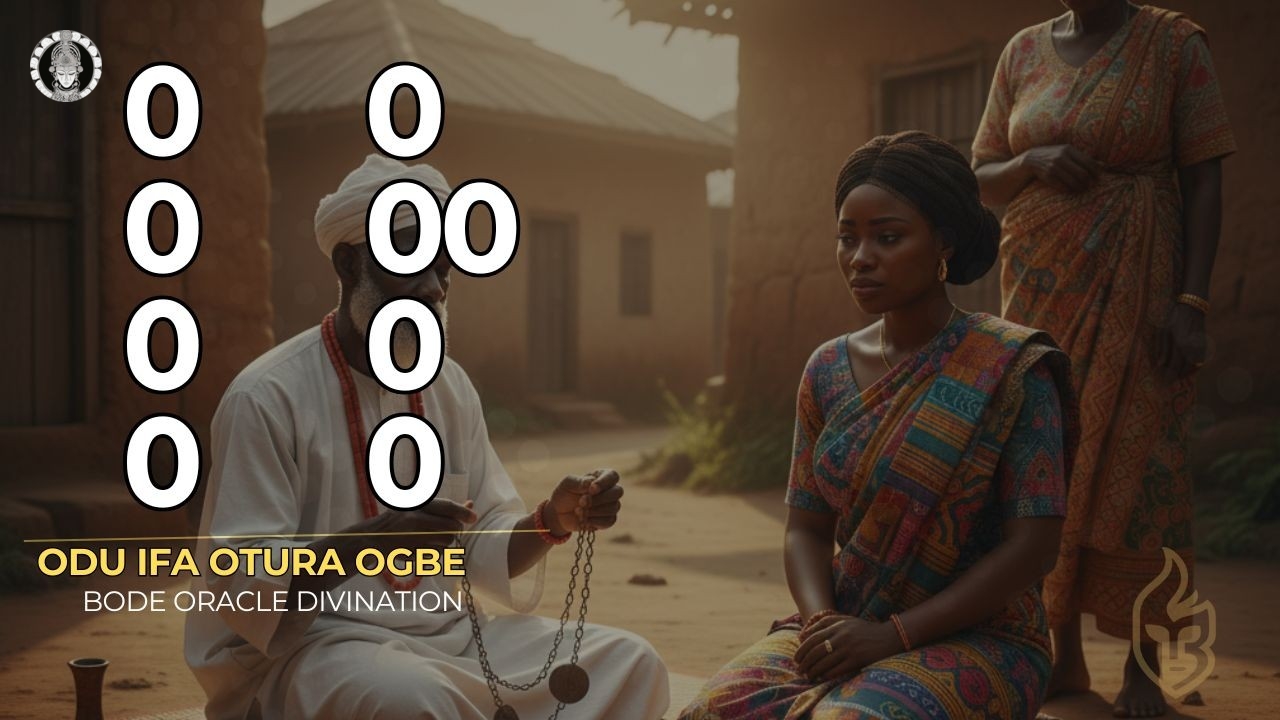
Ifa Divination for Ori: Your Destiny's Protection Against Spiritual Attacks
Understanding Spiritual Warfare and Destiny's Defense
This divination from Otura Ogbe addresses a frightening reality—people are actively sending spiritual attacks and malicious intentions toward the person receiving this Odu. They are spreading evil messages, engaging in spiritual warfare, and attempting to cause harm through supernatural means. However, Ifa reveals something profound: the person's Ori (personal destiny) has been actively deflecting these attacks, making them ineffective despite the enemies' efforts.
This divination teaches a fundamental principle in Yoruba cosmology: Ori, when properly honored and maintained, serves as the first and most powerful line of spiritual defense. No external force, no matter how malicious or powerful, can overcome a person's destiny when that destiny is properly aligned and spiritually fortified. The verse explicitly states that "Destiny does not like the death of its priest"—meaning that your Ori has vested interest in your survival and prosperity.
The Sacred Verse
Ori koku awo won lode Egba
Sunbola awo won lode Ijesa
Abusundaja ni sawo won lekoto iwerejeje
Adifafun ori
Ori nlo le ko fun ku
Ebo won ni o se
O gbebo nibe orubo
Nje ape ori ori o je
Konko meji ni dun hohoho.
English Translation
Destiny Does Not Like the Death of Its Priest
In the town of Egba, Sunbola is its priest.
In the town of Ijesa, Abusundaji is its priest.
In Ekoto Iwereje, he is also its priest.
The divination of Ifá for Destiny,
Who was going to reject death.
He was asked to offer a sacrifice,
And he complied.
It was a frog that had been making noise.
The Spiritual Significance of the Frog (Konko)
The appearance of the edible frog (konko) in this divination carries multiple layers of meaning. Frogs are liminal creatures, living between water and land, capable of moving between different realms. Spiritually, they represent the ability to navigate between the physical and spiritual worlds, between visible and invisible realities. When Ifa prescribes offering frogs to Ori, it establishes this liminal capacity within the person's destiny—the ability to detect spiritual attacks and respond appropriately.
The phrase "it was a frog that had been making noise" suggests that what appears small or insignificant often carries powerful messages. Frogs croak persistently, announcing their presence despite their small size. Similarly, when our Ori speaks to us—through intuition, dreams, or inner knowing—we must pay attention to these "small voices" that often carry life-saving information.
Frogs also represent fertility and transformation. They begin as eggs, become tadpoles, and finally mature into adult frogs—a complete metamorphosis. Offering frogs to Ori symbolizes the transformative power of destiny to change circumstances completely, turning attacks into blessings and danger into opportunity.
The Geographic References: Multi-Dimensional Protection
The verse mentions three different towns—Egba, Ijesa, and Ekoto Iwereje—where Ori has priests. This is not mere geographical listing but spiritual principle: destiny operates across all dimensions, all locations, all circumstances. No matter where attacks come from, no matter which spiritual tradition enemies employ, Ori has the capacity to defend because it transcends all boundaries and operates at a more fundamental level than any attack.
Prescribed Offerings (Ebo)
For protection against spiritual attacks and strengthening of destiny, Ifa prescribes roosters (akuko adie), multiple edible frogs (konko lopolopo), and money (opolopo owo). The roosters represent vigilance and announcement—they crow at dawn, alerting everyone to the new day. Spiritually, they announce the person's victory over spiritual attacks. The frogs, as discussed, establish transformative and liminal power within destiny. The money facilitates the spiritual work and demonstrates the person's commitment to their own spiritual protection.
Additionally, Ifa prescribes kola nuts (obi) and wine (oti) for propitiating Ori. Kola nuts represent hospitality, peace, and spiritual communication—they open channels between the person and their destiny. Wine represents joy, celebration, and the sweetness that destiny desires to bring into the person's life.
Practical Application and Understanding
For those receiving this Odu, several important messages emerge. First, awareness that spiritual attacks are happening is itself a form of protection—what we're conscious of, we can address. Second, the attacks have been unsuccessful not because of luck but because of Ori's active protection. Third, strengthening this protection through sacrifice ensures continued victory over all spiritual warfare.
Modern application includes not only traditional offerings but also practices that honor and strengthen one's sense of destiny and purpose: meditation on life purpose, journaling about one's calling, making decisions aligned with authentic self rather than social pressure, and protecting one's energy through boundary-setting and selective association. For deeper understanding of Ori in Yoruba cosmology, explore comprehensive documentation on Ifa philosophy.
Ifa Divination for Omowunmi: Receiving the Blessing of Children
Understanding the Spiritual Blockage to Fertility
This divination from Otura Ogbe addresses one of life's deepest sorrows—the longing for children that remains unfulfilled. The name Omowunmi itself means "child pleases me" or "I desire children," indicating that this divination speaks directly to those whose hearts ache for parenthood. However, Ifa reveals something unexpected: there is a piece of clothing stored away in the home that must be released as sacrifice before the blessing of children can manifest.
This teaching carries profound wisdom about how material attachments and unresolved possessions can block spiritual blessings. The clothing mentioned was purchased jointly with others (oun ati awon kan lo jo ra aso yi papo), meaning it carries mixed ownership and shared spiritual energy. Such items, even when physically stored away and forgotten, maintain energetic presence that can prevent new blessings—including children—from entering one's life.
The Symbolism of Stored Clothing
Clothing represents identity, covering, and social presentation. Stored clothing—particularly clothing purchased with others but never worn—represents incomplete transitions, unresolved relationships, or attachment to past identities that prevent embracing new roles. For someone longing for children, the stored clothing might symbolically represent holding onto pre-parental identity or unresolved connections that prevent the full embrace of parenthood.
The instruction to use this clothing as sacrifice is revolutionary: it teaches that fertility sometimes requires releasing not just physical space but emotional and spiritual space. The home must make room—literally and energetically—for children to arrive. Clearing out stored items, particularly those with complex ownership or emotional history, creates the energetic vacuum that new life rushes to fill.
The Sacred Verse
Ori ko ku awo won lode Egba
Sunbola awo won lode Ijesa
Abu sun daja ni sawo won ni koto iwerejeje
Adifafun omowunmi
Omo ataso gbomo lowo won
Igba ti n momi oju so gbere ire omo
Ebo won ni o se
O si gbebo nibe o rubo
Kee pe
Kee jinan
E wa bani ni jebutu omo.
English Translation
Destiny Does Not Like the Death of Its Priest
In the town of Egba, Sunbola is its priest.
In the town of Ijesa, Abusundaji is its priest.
In Kotewerenjeje, he is also its priest.
The divination of Ifá for Omowunmi,
Who longed to have children.
Being the child of the one who distributes clothes
Before taking babies from everyone.
When he was crying for the blessing of having a child,
He was asked to offer a sacrifice,
And he complied.
There is no prolonged silence,
Nor an excessively long wait.
Come and rejoice with me in the blessing of having children.
The Mystery of "Distributing Clothes Before Taking Babies"
The phrase "the child of the one who distributes clothes before taking babies from everyone" (ataso gbomo lowo won) contains esoteric wisdom about the relationship between generosity and fertility. In traditional society, distributing clothes represents care, provision, and social responsibility. The verse suggests that those destined for parenthood often first demonstrate parental qualities through caring for others' needs before receiving their own children.
This could also reference the practice of caring for others' children, helping raise nieces and nephews, or demonstrating parental capabilities before becoming biological parents. The universe tests our readiness for the blessings we seek by observing how we handle related responsibilities on smaller scales.
Prescribed Offerings (Ebo)
For receiving the blessing of children, Ifa prescribes a hen (agbebo adie), money (opolopo owo), and critically, the stored clothing that must be released. The hen represents fertility—hens lay eggs regularly and nurture their chicks with fierce devotion. Offering a hen spiritually aligns the person with fertile energy and maternal/paternal protection instincts.
The clothing must be found and brought out of storage, then incorporated into the sacrifice. This physical act of searching for, finding, and releasing the clothing mirrors the spiritual work of identifying and releasing whatever blocks fertility. Some people discover that the "clothing" is metaphorical—representing past relationships, old dreams that must be released, or identities that prevent embracing parenthood fully.
Modern Application and Medical Considerations
This divination does not replace medical fertility treatments but complements them. Many couples find that addressing spiritual blockages alongside medical interventions produces better outcomes. The instruction to search one's home for stored items and release them can prompt important conversations about readiness for parenthood, unresolved issues that might affect parenting, or emotional baggage that needs clearing.
For those receiving this Odu, the message offers hope: childlessness is not permanent fate, spiritual intervention can remove blockages to fertility, and sometimes what prevents blessing is not major obstacles but small, forgotten attachments that simply need releasing. The promise is clear—"there is no prolonged silence, nor excessive wait"—meaning that once the sacrifice is properly performed, the blessing manifests in appropriate time. Explore more fertility blessings in Ogunda Oturupon divination teachings.
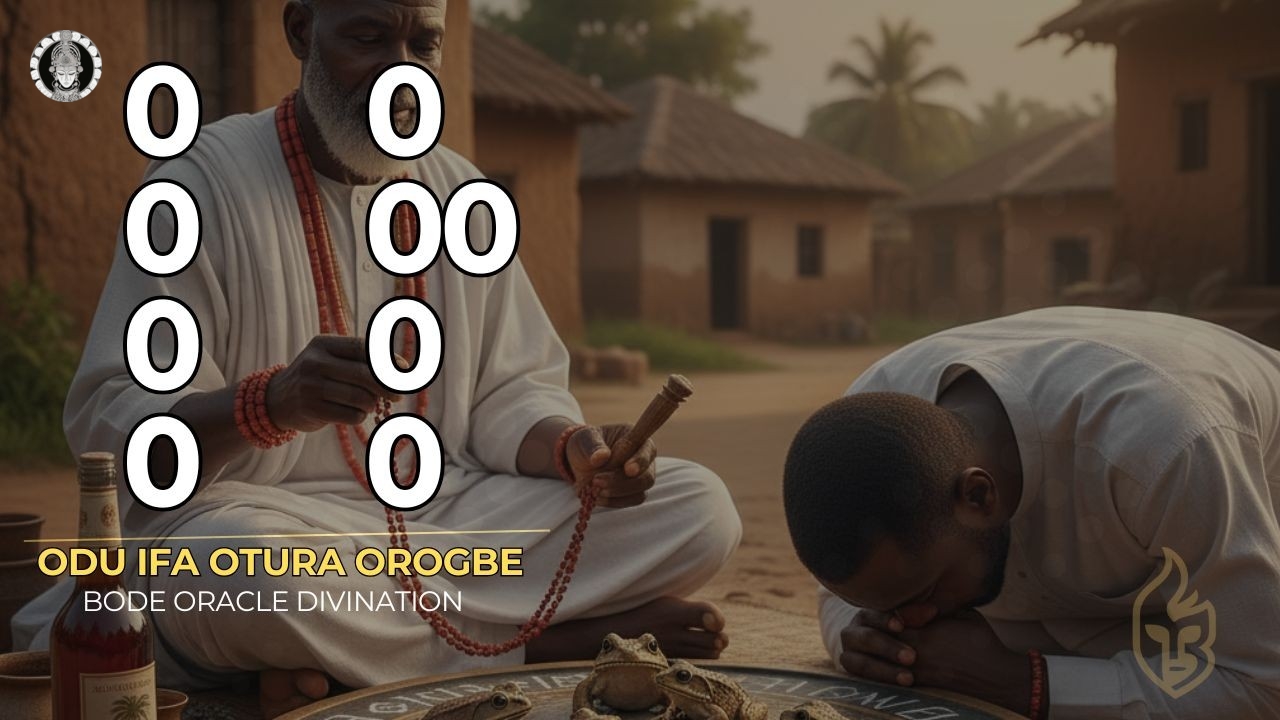
Akose and Spiritual Preparations of Otura Ogbe
Understanding Akose in Ifa Practice
Akose refers to spiritual preparations or medicinal formulations that combine herbal, animal, and sometimes mineral substances with spiritual invocations to produce specific results. Unlike ebo (sacrifices) which are offered to spiritual forces, akose are preparations that the person uses directly—either consuming them, bathing with them, or applying them to the body. The akose of Otura Ogbe are particularly powerful for attracting prosperity and defeating enemies.
Akose Awure Ola: Preparation for Wealth and Honor
This akose is specifically designed to attract prosperity, honor, and fortune (ola) into one's life. The preparation involves combining herbal and animal elements in a spiritually precise manner and consuming them to internalize the blessing of wealth.
Ingredients and Preparation
The akose requires inabo herbs ground together with locust beans (iru isebe) and iyere, then used to cook pork cut into sixteen pieces. Palm oil and salt are added for taste and spiritual enhancement. The preparation must be eaten while hot for maximum spiritual effectiveness.
Spiritual Significance of the Ingredients
Inabo herb is known in Yoruba herbal medicine for its wealth-attracting properties and ability to make one's endeavors fruitful. Locust beans (iru) represent patience and persistence—they have a strong, lasting flavor that doesn't fade quickly, symbolizing wealth that accumulates steadily and remains stable. Iyere herb provides additional power for manifesting desires and drawing opportunities.
Pork is significant as it represents abundance—pigs are productive animals that reproduce prolifically. In spiritual terms, pork carries the energy of multiplication and plenty. The instruction to cut it into sixteen pieces is not arbitrary; sixteen represents the sixteen major Odu Ifa, invoking the complete power of all Ifa wisdom. Each piece consumed becomes a prayer for comprehensive prosperity covering all aspects of life.
The Importance of Eating It Hot
The requirement to consume this akose while hot (ti o ba tijinan, a o koje ni gbigbona) carries spiritual logic. Heat represents active energy, immediate manifestation, and spiritual power at its peak. Eating the preparation hot ensures that its spiritual properties are absorbed while fully activated, creating immediate alignment with prosperity consciousness. It also demonstrates urgency and commitment—the person literally cannot delay or procrastinate when something must be eaten while hot.
Akose Isegun Ota: Preparation for Victory Over Enemies
This akose is designed for protection and victory in spiritual warfare, ensuring that enemies' plans fail and that the person remains secure despite opposition.
Ingredients and Preparation
The akose combines three peregun herbs (odo ewe peregun meta) and three eru Alamo substances, ground together with black soap (ose dudu). This mixture is placed on a strong stone (okuta ako) and used for bathing every morning.
Spiritual Significance of the Ingredients
Peregun herb is renowned in Yoruba spiritual practice for its protective and victory-giving properties. The use of three of them (meta) invokes completeness and reinforcement—physical, spiritual, and emotional protection operating simultaneously. Eru Alamo represents spiritual authority and the power to command circumstances. When combined, these ingredients create formidable spiritual defense.
Black soap (ose dudu) is specially significant in Yoruba spirituality. Unlike regular soap, ose dudu contains specific herbs and has been traditionally used for spiritual cleansing. It doesn't merely clean physically but removes spiritual contamination, negative attachments, and the residue of enemies' attacks. The blackness represents absorption—it draws out and absorbs negativity.
The Symbolism of the Strong Stone
Placing the soap mixture on a strong, solid stone (okuta ako) before use is crucial. The stone represents immovability, unshakeable foundation, and enduring strength. By placing the soap on stone, the preparation absorbs these qualities. When used for bathing, the person doesn't just wash away enemies' attacks but establishes themselves on unshakeable spiritual foundation that no opposition can disturb.
Morning Bathing Ritual
The instruction to bathe with this preparation every morning (a o ma fi we laro laro) establishes daily spiritual renewal. Mornings represent new beginnings, fresh starts, and the defeat of darkness. By bathing each morning with this powerful preparation, the person begins each day spiritually fortified, protected, and positioned for victory. It transforms the routine act of bathing into spiritual warfare—washing away enemies' plans while establishing divine protection.
Important Considerations for Akose Use
Both akose preparations should only be prepared and used under the guidance of a qualified Babalawo who can properly invoke the necessary incantations and ensure correct preparation. The spiritual power of akose comes not just from the physical ingredients but from the prayers, invocations, and spiritual knowledge that accompany their preparation and use.
Additionally, some ingredients may need adaptation for modern availability or dietary restrictions. A knowledgeable practitioner can suggest appropriate substitutions that maintain spiritual effectiveness while accommodating contemporary circumstances. The principle remains constant even when specific ingredients vary: alignment with spiritual forces through material offerings and ritual practice manifests desired outcomes. For scholarly perspectives on Ifa medicinal and spiritual practices, consult research on Ifa divination systems.
Additional Resources
Internal Links
- Ogbe Otura - Related Odu teachings on fertility and blessings
- Complete Odu Ifa Directory
- Bode.ng Blog - Extensive collection of Ifa and Yoruba spirituality articles
- Bode.ng - Main platform for divination services and community
External Resources
- African Traditional Religions: Ifa Divination - Duquesne University
- Ifa of the Yoruba People of Nigeria - UNESCO Archives
- Algebraic Characterization of Ifa Main Divination Codes
- UNESCO Recognition of Ifa Divination System
- Ifa Divination System - Wikipedia
- Opon Ifa (Divination Tray) - Wikipedia
Connect With Us on Social Media
- BODE Oracle on TikTok
- BODE Oracle on YouTube
- BODE Oracle on Facebook
- BODE Oracle on X (Twitter)
- BODE Oracle on Pinterest
Visit Bode.ng to explore more divination teachings, participate in quizzes and polls, and connect with our community of practitioners and learners. Register today to access exclusive content and personalized guidance on your spiritual journey.
Frequently Asked Questions And Answers About Odu Ifa Otura Ogbe (Otua Orogbe)
Find answers to common questions about this sacred Odu Ifa and its divination teachings
Otura Ogbe, also called Otua Orogbe, is one of the 256 sacred Odu (divination signs) in the Ifa corpus. It carries powerful messages about wealth attraction, mental and physical health, destiny protection from enemies, and fertility blessings. This Odu teaches that through proper sacrifice and maintaining relationship with Osun deity, one can achieve financial prosperity, overcome mental disorders, defeat spiritual attacks, and receive the blessing of children.
The divination of Alaba Owo in Otura Ogbe specifically addresses wealth attraction. Ifa promises that through proper sacrifice using a dove and money, combined with feeding the Osun deity, one can achieve comfortable living and financial prosperity. The name Alaba Owo means 'the child of the person who keeps money at home,' signifying that this Odu brings the blessing of accumulated wealth and financial stability.
The divination of Alagbamun in Otura Ogbe addresses mental disorders and head-related illnesses. Ifa prescribes sacrifice using a rooster, money, and importantly, a cap (fila pupa). The cap represents covering and protecting the head, both physically and spiritually. This divination teaches that mental clarity and psychological well-being require spiritual intervention alongside any medical treatment, and that the head as the seat of consciousness needs special spiritual protection.
The divination of Ori (Destiny) in Otura Ogbe reveals that enemies are sending evil messages and spiritual attacks, but one's destiny naturally protects against them. Ifa instructs propitiating one's Ori (personal destiny) with edible frogs (konko), kola nuts, and wine. The verse teaches that destiny does not like the death of its devotee, and when properly honored, it actively deflects all spiritual attacks and malicious intentions directed at the person.
The divination of Omowunmi in Otura Ogbe addresses the deep longing for children. Ifa reveals that there is a piece of clothing in the home that was purchased jointly with others and stored away. This clothing must be offered as sacrifice along with a hen and money. The verse teaches that fertility blessings often require releasing attachment to material possessions, and that items with shared ownership or mixed spiritual energy can block the manifestation of children.
Osun holds special importance in Otura Ogbe, particularly in the divination for wealth. The verse states 'Osun has truly come' when blessing arrives. Osun represents wealth, beauty, fertility, and comfortable living. Feeding Osun as prescribed in this Odu establishes a spiritual relationship that attracts prosperity and ensures that wealth, once gained, remains stable and grows. Osun's presence in this Odu connects financial blessing with aesthetic beauty and graceful living.
Akose Awure Ola is a spiritual preparation for attracting wealth and honor. It combines inabo herbs ground with locust beans (iru) and iyere, used to cook pork cut into sixteen pieces with palm oil and salt. The person must eat it hot. The number sixteen is spiritually significant as it represents the sixteen major Odu. Locust beans represent patience in accumulation, while pork represents abundance. Eating it hot ensures immediate spiritual activation.
Akose Isegun Ota is a spiritual preparation for victory over enemies. It combines three peregun herbs and three eru Alamo substances ground with black soap (ose dudu). The soap is placed on a strong stone and used for bathing every morning. The stone represents unshakable foundation, peregun provides protective power, eru Alamo brings spiritual authority, and black soap cleanses away negative energy. Morning bathing ensures daily renewal of spiritual protection.
The edible frog (konko) appears in the divination of Ori as the key offering to destiny. The verse states 'It was a frog that had been making noise,' suggesting that what appears small or insignificant (like a frog's croaking) often carries powerful spiritual messages. Frogs represent transformation, as they live between water and land, symbolizing the ability to navigate between spiritual and physical realms. They also represent fertility and abundance due to their prolific reproduction.
Otura Ogbe emphasizes the importance of compliance with spiritual prescriptions. All four divinations show people who 'complied' with Ifa's instructions and received blessings. The Odu teaches that knowledge without action is worthless, that spiritual protection requires active participation through sacrifice, that mental health requires both spiritual and practical intervention, and that releasing material attachments (like the stored clothing) opens pathways for new blessings to manifest.
All sacrifices (ebo) and spiritual preparations (akose) in Otura Ogbe should be performed under the guidance of a qualified Babalawo. The priest ensures proper procedures, invokes necessary incantations, and adapts traditional practices to modern contexts. Different divinations within Otura Ogbe address different life challenges—wealth, mental health, spiritual protection, fertility—each requiring specific offerings. The spiritual power comes from both the materials used and the prayers and invocations that accompany them.
This recurring phrase in Otura Ogbe teaches profound wisdom about divine timing. When prescribed sacrifices are performed with faith, blessings manifest at the appropriate time—not delayed to the point of despair, nor rushed to the point of instability. This demonstrates that Ifa's blessings unfold according to spiritual laws rather than human impatience or anxiety. It encourages patience combined with action, trusting the process while fulfilling spiritual obligations.
You can explore comprehensive information about Otura Ogbe through several resources:
- Complete Odu Ifa Directory
- Bode.ng Blog - Extensive articles on Ifa spirituality
- Ogunda Oturupon - Related teachings on fertility
- Bode.ng - Access divination services and community resources
Connect with us on social media for regular teachings: TikTok, YouTube, Facebook, X (Twitter), and Pinterest @BODEOracle.
